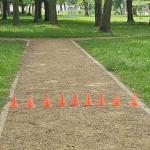Guest Blogger, Dr. Ann Randerson
May 20th is Pentecost Monday, called Lundi de Pentecôte in French and Pinkstermaandag in Dutch and Flemish, and is the next public holiday after Pentecost Sunday. It is a bank holiday in Belgium, so all shops are closed and most people did not have to work. It is a holy day, a time when everyone rests and families gather to enjoy picnics in their gardens, on the seaside or in the local park. In my village, mostly elderly people walked the cobbled streets to attend morning mass. Others did spring cleaning, washed windows, polished cars, but no mowing the lawn or trimming the hedges, because in Belgium it is forbidden to do so on Sundays or public holidays.
On Whit Monday, I took a walk in my local park for some fresh air and inspiration. Nature is a healthy option to combat stress and fatigue and it nourishes my soul. As I walked along the dirt path between rows of sturdy trees, I noticed how lush the leaves were and how tall the grass was. It was uncommonly sunny and warm outside. Our winter had been unusually wet and cold.
For the last few years, our commune, or Gemeente (“municipality” in English), has decided not to mow the grass during May. This is to make the area bee-friendly and allow wildflowers to grow so that the bees can pollinate them. Recently, there has been a sharp decline in the bee population, which can be attributed to habitat loss, pesticides, and global climate change. I am pleased to say that most of the residents of my village are aware that pollination by insects, especially bees, is essential to ensure the biodiversity and sustainability of plants and crops. So they adhere to this informal rule, as evidenced by the calf-tall grass and flowers blooming in their yards.
Obstacles in my path
Yesterday, I was strolling through the park, enjoying the vibrant colors of the wild dandelions, daisies, bee balms, snapdragons, crocuses, lavender, foxgloves, cornflowers, and cosmos, when I saw a few families having a picnic in the sun. Then, a few yards away, I saw a young boy in a blue shirt. He looked just old enough to ride a bike, which was clear as he zigzagged in front of me down the narrow dirt path. I circled him and continued on my way, when he suddenly stopped. To my surprise, he stepped on the pedals, stumbled a little further next to me, then spun his wheel again, blocking my way. Startled, I stopped, glanced at his parents as they held up a volleyball net, and continued on my way around him. This happened many times. Each time, he looked up at me with a broad grin.
“So that means we're going to run an obstacle course,” I thought with a smile.
Changing direction: an unexpected discovery
Remembering how I sometimes got bored as a child, I played with him for a while, enjoying the way his eyes lit up whenever he blocked my path. Either he finally got bored of playing, or I had gone too far and taken a right at the fork where I usually turn left. I took a few steps and found a plastic object buried in the grass next to a tree trunk. It looked like someone's hearing aid charger, which made sense as I was near the local Lusthaus (a assisted living centre for seniors). I went inside to return it, but it was a public holiday and the reception was closed. As I was leaving I noticed some pamphlets. One was about dementia, others about life at the centre and the serviced apartments across the park. I took a couple of pamphlets.
This discovery was timely, but I wanted to avoid thinking about it. My parents-in-law are getting older, and my father-in-law has lost much of his memory since his heart attack just a year ago. We had been putting off discussing what to do next. The pamphlet might help us make an important decision.
In fact, yesterday's walk led to a meaningful discovery. As I rounded another corner, a boy on a wobbly bike smiled at me through the trees. This time, his whole family laughed as I passed him on his bike every time he skidded to a halt. After a while, I noticed orange cones up ahead. Someone had placed a row of small cone-shaped objects in the middle of the dirt path, presumably to keep the boy from cycling out of the park; a safety barrier from concerned people, perhaps his loving family.
My role as a spiritual director is to help my clients understand the spiritual meaning that permeates their lives, including the unexpected obstacles that arise along the way, and in my next post I’ll share more about how to do this.
I would like to extend a special thank you to Teresa Blythe for the opportunity to contribute to Spiritual Direction 101.
Dr. Anne Randerson graduated from the Phoenix Center for Spiritual Direction Apprenticeship Training Program in January 2024. Anne lives in Brussels, Belgium and is a spiritual director, author, mindfulness-based transition coach, teacher of meditation practice and creative expression, and a member of Spiritual Directors International (SDI). In 2003, Anne completed her PhD in Human Life Studies after six years of study in Northern Japan. Her dissertation was titled “Human Lifestyles and Sensitivity to Nature: A Comparative Study of Japan and the West from a Religious Perspective”. Anne has lived in five countries, speaks six languages, and currently offers online sessions to spiritual directors of various faiths, cultures, languages, and backgrounds. She is especially welcoming to those from LGBTQIA+, neurodiverse (including ADHD), global and creative communities, and those facing chronic illness, grief, and loss. Ann also hosts spiritual direction for interfaith groups, nature-based meditation retreats, and will soon be leading an international pilgrimage. To contact Ann, visit https://evocativesoul.com or email info@evocativesoul.com.

Leave a Reply